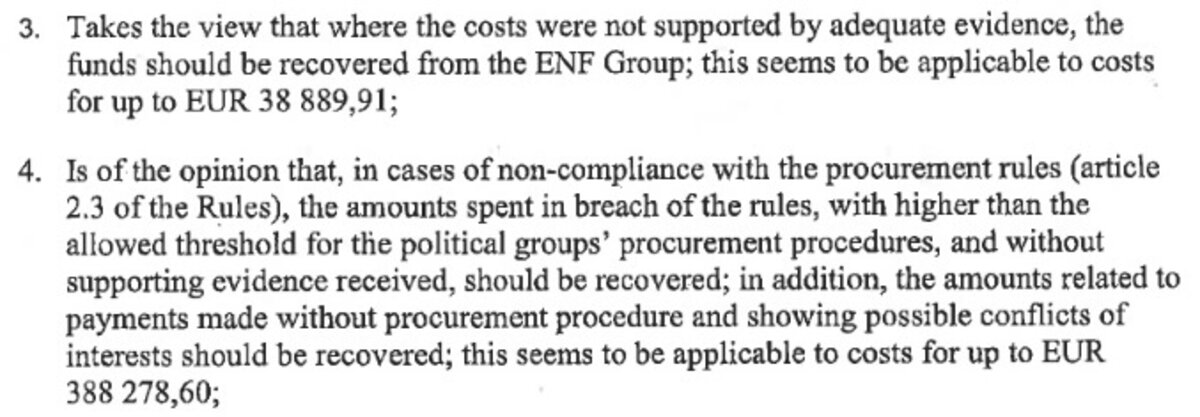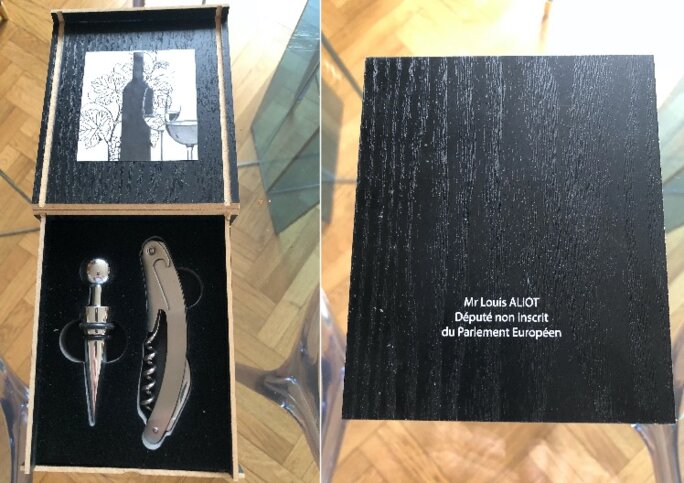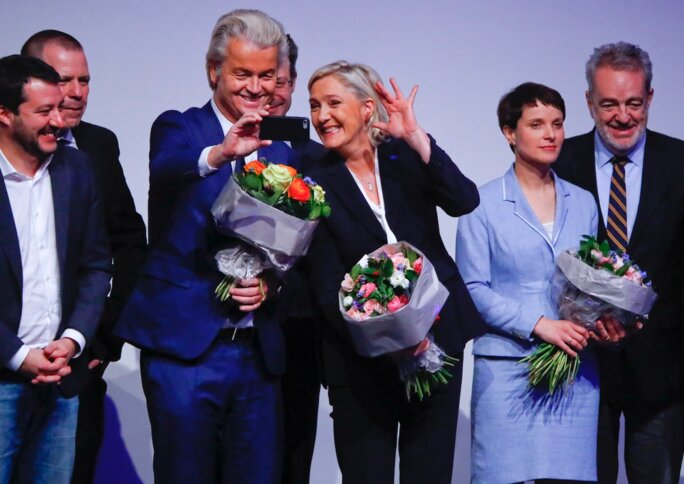It has not been as well publicised as the ongoing 'fake jobs' affair involving the employment of European Parliamentary assistants. But the European Parliament is this month set to reclaim up to 427,000 euros in “non-compliant” or “unreasonable” expenses from the far-right Parliamentary grouping that includes France's Front National, Mediapart has learnt. If an action for reclamation of funds against the Europe of Nations and Freedom (ENF) group does take place then it could cause further problems for the FN – which is about to undergo a name change – ahead of the May 2019 European elections.
The decision on whether to demand repayment of the money will be made by the European Parliament Bureau, which is due to meet on March 19th and which comprises the Parliament's president, its 14 vice-presidents and five quaestors, who handle administrative and financial affairs affecting MEPs. Before that they will seek the opinion of the Parliament's budgetary control committee, which is due to report on the issue this week.
Mediapart has seen a document that was written by MEPs on that committee ahead of its final recommendation to the Bureau. But while certain details and phrasing could change, the basic position is likely to remain unchanged. For the conclusion reached in the report is unyielding: that the European Parliament must reclaim from the Front National and its allies more than 427,000 euros.
As Mediapart revealed in the summer of 2017, an initial report from external auditors Ernst & Young put the total amount of 2016 expenses considered as “non-compliant” with European parliamentary rules at 546,383 euros. That was 17% of the ENF group's total expenses in that year. The parliamentary authorities then once again asked the ENF group to produce paperwork justifying its expenditure.
The group's treasurer Gerolf Annemans, of the Flemish party Vlaams Belang (VB) did respond but his efforts do not seem to have satisfied the authorities. Mediapart asked Nicolas Bay, co-president of ENF and vice-president of the FN, for his explanation of the “non-compliant” expenses from 2016. He says there is an “issue of interpretation of the rules” in relation to the procurement procedures used by the group for its service contracts.
Bay said the group thought that the procurement rules applied “service by service when they were of a different nature” and did not apply per service provider. That explained why in certain cases invitations to tender were not issued, he says. “There was absolutely no wish on our part to contravene the rules,” says Nicolas Bay, who said that subsequently the ENF “complied rigorously with the more restrictive interpretation” of the Parliament from 2017 by putting in place “tighter rules inside the group”.
The former FN member Ludovic de Danne, who was secretary general of the ENF until September 2017, told Mediapart that its expenditure was “absolutely legal”. He criticised what he said was a “severely botched” audit and a “skilfully calculated interpretation” from the “pro-European” Ernst & Young. Danne says that at the time he wanted to “attack this interpretation and Ernst & Young in the courts” but says that the group's treasurer kept a “curiously low profile”. Today Ludovic de Danne says he is “perfectly relaxed” about the ENF group's conduct, though he did not comment on any of the detail of the expenses that have been highlighted as a problem.
Some of the money – 38,889.91 euros - set to be reclaimed concerns expenses which were “not supported by adequate evidence”. But the bulk of it, 388,278.60 euros, relates to procurement rules that have not been respected in relation to service providers.

Enlargement : Illustration 1

Each year the European Parliament allocates a budget to every political grouping to cover their collective working costs, known in the jargon as 'budget line 400'. In return the groups have to send their annual accounts to the Parliament's financial services before April 30th. They are then audited by an external body, in this case Ernst & Young. Last year this firm issued what is known as a “qualified opinion”, meaning that it had had some misgivings about a specific aspect of the ENF's accounts.
At the time the external auditors were also worried about a series of expenses that it was unable to calculate but which appeared not to have been managed properly. This concerned in particular the cost of meetings, meals and the purchase of “gadgets”. The view of the parliamentary committee – which does not have the final say – is a little more precise on this point. It openly questions the reimbursement for meals that were claimed at 400 euros a person and the handing out of Christmas presents worth 100 euros each to 110 people. Such expenditure was “not reasonable therefore not acceptable”, write the MEPs on the committee, who say the money involved should be returned to the Parliament.

Enlargement : Illustration 2

The report also devotes a section to the group's purchase of bottles of champagne. The MEPs say they want to know to whom the 228 bottles purchased in 2016 went. They also highlight the purchase of six other bottles of a value of more than 81 euros, and wonder if “any bottles are left”.
Champagne gifts
The ENF's Nicolas Bay says that there has been no contraventions “in relation to the Parliament's rules”, meaning that the group's spending per item had not exceeded the set limits. Under the rules governing 'budget line 400' groups are allowed to buy promotional items and gadgets such as pens with the name of the Parliament or individual MEP on it, to promote the institution or MEP's work. But the price per item should not exceed 100 euros. However, Bay does not comment on the quantity of items bought, which Parliament considers excessive, and the use made of those presents.
As for the champagne, whose destination is not specified, and some of which was bought at high prices, Bay replies: “There could be explanations for that, given that one arranges receptions.” However, these bottles were marked down as promotional presents and not as reception expenses.
In May 2017 Mediapart revealed that Jean-Marie Le Pen, the FN's founder and father of current party boss Marine Le Pen, had used some of the money allocated at the European Parliament for communications purposes to arrange for more than a hundred bottles of fine wines to be delivered to his manor house at Saint-Cloud near Paris. The total cost of this was 8,500 euros. The Parliament carried out checks on the legitimacy of these expenses. A bill published by Mediapart at the time detailed several fine champagnes, costing between 89 and 97 euros a bottle.

Enlargement : Illustration 3

Jean-Marie Le Pen's case is separate from the current one. Excluded from the party he founded, Le Pen is one of the “independent” MEPs sitting at the legislature in Strasbourg. Yet the FN MEPs and their allies seem to follow identical practices; using Parliament funds to buy bottles of champagne which are then claimed under the heading of political communications. The reason none of the bottles bought by members of the ENF group exceed 100 euros each is because of the 100-euro restriction on promotional items in budget line 400 expenditure.
An example of the practice took place at Christmas 2014 when Louis Aliot, vice-president of the FN, had just been elected as an MEP. He arranged for numerous boxes of Jeff de Bruges Belgian chocolates, bottles of champagne, gadgets such as corkscrews and pétanque sets to be sent to the headquarters of FN councillors in Perpignan in southern France to be handed out. On the boxes were the words: “Louis Aliot, European Member of Parliament”.
Nicolas Bay says he is now awaiting the decision of the European Parliament Bureau. He points out that the auditing firms used vary from one political grouping to another and calls for “the same rules to be applied in 2016 to every group”. He also says there should be a certain discretion when it comes to a group's handling of its expenditure. “The Parliament's general rules set a framework and apart from that the groups should be able to work without being shackled in their political and parliamentary activity,” says Bay.

Enlargement : Illustration 4

It took a year of difficult negotiations for Marine Le Pen and her allies in the Parliament to form the ENF group in June 2015. Today the grouping, co-presided by Nicolas Bay, contains 37 MEPs from nine countries: the Front National in France, the FPÖ from Austria, the Belgian party Vlaams Belang, the Party for Freedom or PVV from Holland, the Northern League from Italy, a member of the AfD from Germany, a British MEP from UKIP (which she has since left), two MEPs from Poland's Congress of the New Right or KNP, and an MEP from Romania.
In September 2017 Ludovic de Danne, who was also a very close advisor to Marine Le Pen on foreign affairs, resigned from his position as secretary-general of the ENF group and left the Front National too. His departure was the result of deep internal tensions within the ENF, partly linked to the investigation into non-compliant expenses but also the 'fake jobs' row in which the FN has been accused of giving members fictitious jobs as assistants in the European Parliament.
----------------------------------------------------------------------------
- The French version of this article can be found here.
English version by Michael Streeter


